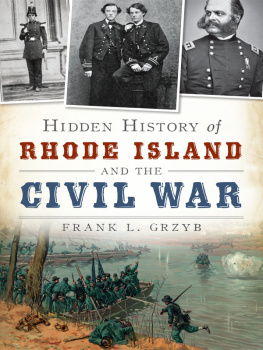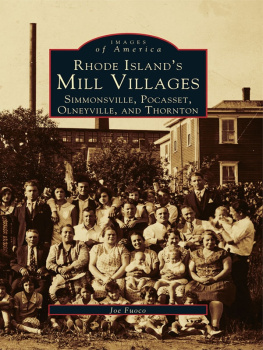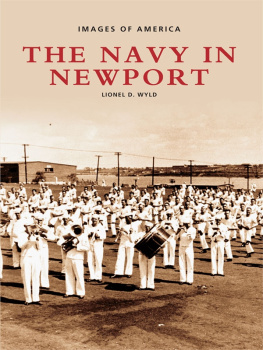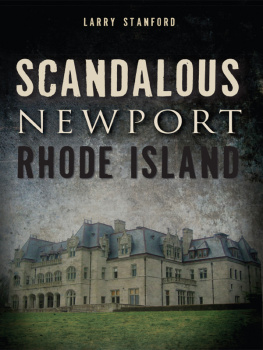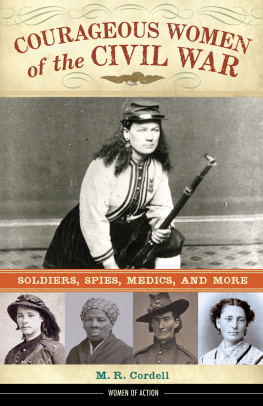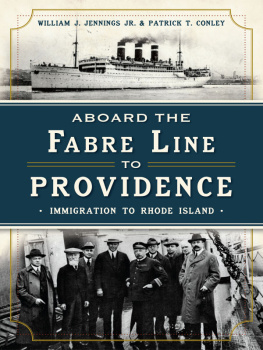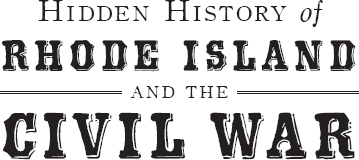
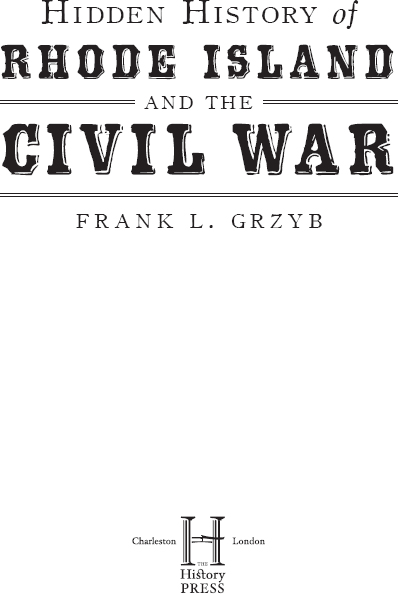
Published by The History Press
Charleston, SC 29403
www.historypress.net
Copyright 2013 by Frank L. Grzyb
All rights reserved
Cover image: Image of Battle of Fredericksburg on front courtesy the Providence Public Library Special Collections.
First published 2013
e-book edition 2013
Manufactured in the United States
ISBN 978.1.62584.707.2
Library of Congress Cataloging-in-Publication Data
Grzyb, Frank L., 1946
Hidden history of Rhode Island and the Civil War / Frank L. Grzyb.
pages cm. -- (Civil War)
print edition ISBN 978-1-62619-231-7 (pbk.)
1. Rhode Island--History--Civil War, 1861-1865. I. Title.
E528.G79 2013
974.503--dc23
2013032983
Notice: The information in this book is true and complete to the best of our knowledge. It is offered without guarantee on the part of the author or The History Press. The author and The History Press disclaim all liability in connection with the use of this book.
All rights reserved. No part of this book may be reproduced or transmitted in any form whatsoever without prior written permission from the publisher except in the case of brief quotations embodied in critical articles and reviews.
In honor of all departed veterans from Rhode Island units who served during Americas Civil War.
And with heartfelt gratitude to the descendants who fight to keep their ancestors sacrifices and contributions alive.
CONTENTS
PREFACE
While researching material for my previous book, I kept stumbling on stories about Rhode Islands participation in Americas Civil War, along with accounts about the conflict that surfaced years later. Some of the tales had been published more than a century ago only to fade into obscurity. In the case of more familiar stories repeated time and again, fresh material has surfaced that suggested a retelling of the stories, especially during the American Civil War Sesquicentennial. Did you know that General Ambrose E. Burnsides personal valet is buried in Rhode Island? That John Wilkes Booths supposed fiance met him in Newport only days before he killed the president? That Abraham Lincoln visited Rhode Island but never as president of the United States? That the U.S. Naval Academy was moved from Annapolis to Newport during the war? Or that a Rhode Island lass openly served as a female soldier in the Union army and as a veteran was granted full membership in the Grand Army of the Republic? These and similar stories about Rhode Island and the Civil War can be found within.
Sit back, relax, kick your shoes off and enjoy the ride. You may be pleasantly surprised at what you learn about Rhode Island, the smallest state of the Union, and its ties to the Civil War.
ACKNOWLEDGEMENTS
This is my fourth book, and in many ways, it has become one of the most enjoyable, exhilarating and rewarding assignments I have pursued in years. Finding interesting Civil War stories with Rhode Island ties, checking facts, writing and smoothing them and bringing them to fruition has been a labor of love helped along appreciably by the likes of Dr. Stephen Altic, DO; historian Henry A.L. Brown; and authors Mark H. Dunkelman, James Garman, Robert Grandchamp, Les Rolston, Heath Twichell and Fred Zillian. Also adding significantly to the effort were William Camara of the Rhode Island Veterans Home, Jordan Goffin of the Providence Public Library Special Collections department, Lori Urso of the Pettaquamscutt Historical Society and Brigadier General Richard J. Valente, USA (Ret). Last but not least, I would like to extend a special thanks to my lovely wife, Ginny, a faculty member in the continuing education program at a local college, for her outstanding editorial assistance during the initial draft process. Nobody said it would be easy, but through the support of these mentioned here, more often than not, it seemed that way.
Part I
IN THE BEGINNING
MISCELLANY
Officially called the State of Rhode Island and Providence Plantations, residents of Little Rhody (as it is affectionately referred to by many inhabitants) always seemed to have their own mindset. Banned from the Massachusetts Bay Colony because his religious views substantially differed from the Church of England, Roger Williams founded the colony of Rhode Island in 1636. His religious doctrine was based on the premise that religion and government could peaceably coexist. The doctrine of separation of church and state (at the time, such thoughts bordered on blasphemy) is the foundation that we as Americans enjoy today: religious tolerance and freedom.
Roger Williams died in 1683, but his ideals lived on. Nearly a century later, colonists faced another challenge: the right of self-determination. Principals from most of the colonies met in Philadelphia, Pennsylvania, to establish their rights over British occupation and tyranny. At least two conventions met before a plurality was achieved. On September 17, 1787, a constitution was drafted, but before the document could become official, it required the approval of nine of the original thirteen colonies. Delaware became the first to ratify the Constitution on December 7, 1787. Although Rhode Island was the first state to declare its independence from Great Britain on May 4, 1776, when the time came to send delegates to the Constitutional Convention, it balked, not once but three times. In March 1788, Rhode Island put the issue up for public referendum. The vote failed. When advised that the state would be treated no different than any other foreign government, Rhode Islanders, now feeling cornered, convened a ratification convention. This time, the measure was approved, but only by a slim two-vote margin. On May 29, 1790, Rhode Island became the last state to ratify the Constitution.
Although Rhode Island was the smallest state in size during the Civil War, it never suffered an inferiority complex. Rhode Islands contributions to the war effort were many. Helped along by hardworking immigrants, the state had developed a large industrial base, especially in the textile industry that greatly aided the Union war effort. Rifles and cannons were also produced in abundance. And when President Lincoln called for troops to quell the rebellion, Rhode Island was the first to respond on April 18, 1861, with an infantry unit and a battery of artillery: the First Regiment Rhode Island Detached Militia and the First Light Battery Rhode Island Volunteers. In the ensuing years, the state mustered eight infantry regiments, three cavalry regiments, nine batteries of artillery and three heavy artillery regiments. All were composed predominantly of Rhode Island men.
When the war ended, from a population of about 175,000, Rhode Island had sent 25,236 civilians off to war, sacrificing 1,685 (491 killed in action) of its brave lads to preserve the Union. Soldiers from the state had been present at all the major battles and numerous skirmishes less known today; 16 received the Medal of Honor, 9 of whom were artillerymen. Of the 9, 7 were awarded to members of Battery G, First Regiment Rhode Island Light Artillery, for extraordinary bravery at Petersburg (no U.S. Army battery since has received as many for a single days engagement). Amazingly, Rhode Island supported Lincolns repeated calls for troops on every occasion, and when the draft was enacted, it never resorted to conscription, having achieved its quota on each occasion.
Perhaps not as well known, Rhode Island was the first state to issue a call for enlistment of black soldiers in the Union army. The Fourteenth Regiment Rhode Island Heavy Artillery (Colored) was made up of not only Rhode Islanders but also black men from other free states.
Next page
